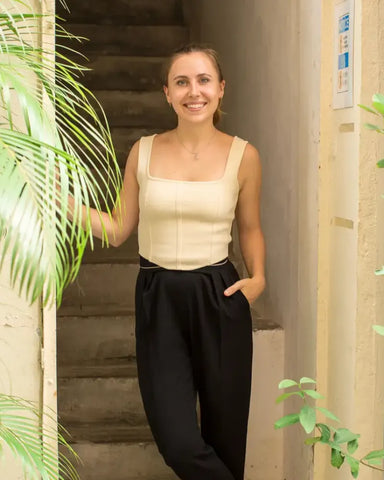
Pain Expert, Therapist
Maxi Schönteich is a Pain expert in the chronic pain space, with years of experience in the private and public healthcare sectors. She works with patients around the world who are experiencing persistent pain. Patients who yearn for a chance at a normal life without depending on a stockpile of supplements, treatments and dashed miracle cures.
Maxi's background in Osteopathic manual therapy as well as her own experience with anxiety and pain have really exposed her to the chronic pain epidemic we are facing. Her approach as a trauma-informed therapist to pain and mental health is through the lens of the nervous system, working towards a felt sense of safety. Her training in nutrition and functional medicine allows me to also address mental health and pain through diet and lifestyle changes. Because ultimately, the mind and the body are interconnected.Q&A
How do you incorporate mindfulness and other stress-reduction techniques into your practice as a pain expert, and how do you encourage your patients to use these strategies as well?
Maxi: Mindfulness helps chronic pain patients change unhelpful responses to triggering situations and events. It gives them space to choose how to react to their pain. Mindfulness has also been shown to alter brain activation and, thus, lowers pain volume.
I get my clients to pay attention and count their breath. A technique I believe is simple to follow and has profound effects.
I also teach my patients meditation practices, including somatic tracking, a key tool in pain reprocessing therapy.
Because ease of accessibility is essential to me, I often recommend apps to help clients make meditation and mindfulness part of their daily routines. My favourite apps include Calm and tapping solution.
What role do social support networks play in managing chronic pain, and how do you help patients build and maintain those networks?
Maxi: Lack of social support and pain have much in common. So much so that persistent pain is now treated through a biopsychosocial lense. We, as humans, are biologically wired for connection. Back in the hunter-gatherer times, being part of a community was vital for survival. Thus our brains are wired to reward us when we are social, secreting hormones that make us feel connected and happy. These neurochemicals are also potent painkillers.
Unfortunately, many individuals that suffer from persistent pain withdraw from social contact. The longer we are housebound, the harder it is to connect socially. Thus, it can help to start small, like texting a friend or scheduling a video call with a friend. You can also participate in groups or workshops or try some volunteering.
Animals are also a big help. Spending time with a pet has been shown to lower blood pressure and stress hormones and boosts mood. All factors benefit the treatment of chronic pain.
How do you prioritize self-care in your work as a pain expert, and what strategies do you use to maintain your mental health?
Maxi: Taking care of my mental health is non-negotiable. I believe without adequate self-care, therapists run the risk of developing burnout. But, when I feel emotionally and mentally resourceful, I can provide better care to my patients.
I take proactive care of my mental well-being. I try to focus on sufficient sleep, exercise and a healthy diet. I tap into the same techniques I teach my clients, including breathwork and mediation practices. I also void long hours spent on social media and am working on prioritising quality time with my loved ones and my pet.
